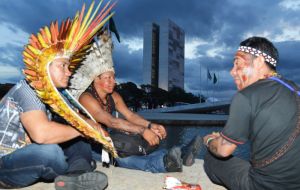MercoPress. South Atlantic News Agency
Land possession and peasants, the first strong clash in Rousseff's cabinet
 Minister Abreu argued there no large estates left in Brazil, although 1% of entrepreneur farmers own half of the country's best land
Minister Abreu argued there no large estates left in Brazil, although 1% of entrepreneur farmers own half of the country's best land  Ananias emphasized on the 'social concept and function' of land property in opposition to the 'individualistic approach'
Ananias emphasized on the 'social concept and function' of land property in opposition to the 'individualistic approach'  The indigenous council recalled that Ms Abreu is known as “chainsaw queen” for promoting the exploitation of Amazonia
The indigenous council recalled that Ms Abreu is known as “chainsaw queen” for promoting the exploitation of Amazonia Land possession has caused the first clashes in the newly named cabinet of President Dilma Rousseff with Agriculture minister Katia Abreu arguing there are no large estates ('latifundium') left in Brazil, while her Agrarian Development peer and a stalwart from the ruling party said a social approach was needed to the land and peasants issue.
As had been anticipated Rousseff's decision to include among her 39 cabinet ministers representatives from all the political forces that supported her re-election, a catch-all umbrella with representatives from the left, right and centre triggered the clashes only six days after inauguration.
“The large estates don't exist anymore” and thus the agrarian reform must not be 'massive' but rather concentrate on those peasants really willing to work the land, and whom besides land must be ensured quality settlements and with the necessary infrastructure“, said Minister Abreu in an interview with the influential Folha de Sao Paulo.
Katia Abreu is a cattle rancher, Senator for the centre right PMDB, the ruling Workers' Party main coalition partner, and president of Brazil's large farmers' union, a formidable lobby given its significance for the country's trade.
However Agrarian Development minister Patrus Ananias, a historic leader from the Workers' Party of Rousseff and who took office surrounded by peasants and small farmers organizations contrary to Ms Abreu nomination openly countered her statements.
”It's not enough with knocking down the fences of the large estates, we also need to knock down those walls which limit us to an individualistic approach excluding the social process“, pointed out Ananias.
According to official data, 1% of Brazilian large entrepreneur-farmers own almost half the good farming land in Brazil and at the other end 90.000 peasants are still camped waiting for the government to comply with the promise of granting them plots of land.
Among those groups are the landless militants from the Landless Movement, MST, who believe the true number is much higher, probably five million, most of whom have settled in the slums or periphery of the large Brazilian cities.
Ananias admitted that agrarian reform is ”a controversial issue with strong resistances“ but must be addressed through 'democratic dialogue' and according to ”social rights“.
”Ignoring the existence of inequalities and injustice in the camp is the way to perpetuate them“, and government must offer and guarantee growth opportunities to the landless peasants so that ”we can make definitive the concept of social function of property“.
MST historically linked to the Workers Party of Lula da Silva and Rousseff reacted strongly to Abreu's statements claiming they ”represent the interests of the most backward segments of farming, that don't make it to minimum productivity averages, methodically spoil the environment and take advantage of slave labor“.
Ms Abreu also clashed with the indigenous tribes organization pressing for an end to the expansion of their reserves and arguing the problem is that ”these tribes have abandoned the jungle and pretend an expansion to farm productive lands“.
The Indigenous Missionary Council, Cimi, linked to the Catholic Church also blasted the Agriculture minister on her statements, arguing they can only be explained because of ”sheer total ignorance or deep ingrained ill faith“.
Finally Cimi recalled that Abreu is known as the ”chainsaw queen“ for her strong support of advancing agriculture in Amazonia, and represents ”the large estates and agro-business that have invaded and eliminated jungles, expelling and killing the peoples that live there”.




Top Comments
Disclaimer & comment rules-

-

-

Read all commentsland and peasants issue....
Jan 07th, 2015 - 01:04 pm 0Rather snobbish attitude is that not..
Its weird that 3rd world countries have headline issues that make it sound like its the 18th Century.
Jan 07th, 2015 - 02:55 pm 0@2. Why is it weird? They are still in the 18th century. If not before. Just look at that reference to 'latifundium'. It connects to the Latin 'latifundia'. The huge estates 'owned' by the Roman wealthy. How did they appear? In the days of the Roman Republic only Roman citizens who were landowners could serve in the legions. While they were away fighting, it was often the case that there was no-one, or just a wife, to continue to operate the farm. They went bankrupt. The wealthy stepped in and bought the land at knockdown prices. South America isn't any different except that the land was stolen from the indigenous people.
Jan 07th, 2015 - 04:53 pm 0Commenting for this story is now closed.
If you have a Facebook account, become a fan and comment on our Facebook Page!